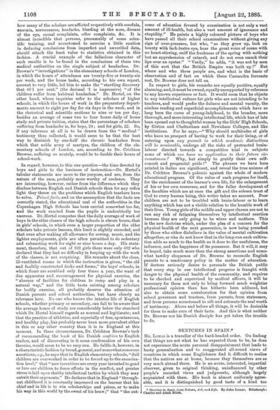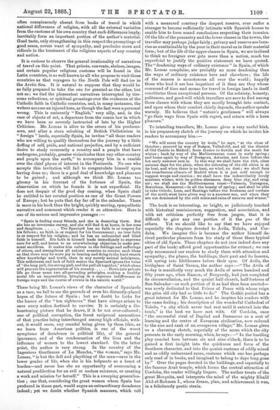SKETCHES IN SPAIN.* Mn. Lomas is a traveller of the
hard-headed order. On finding that things are not what he has expected them to be, he does not experience the acute personal disappointment that leads to hasty generalisation and to exaggerated all-round views of countries in which some Englishmen find it difficult to realise that the natives are at home, because they themselves are so very much abroad there. He is an acute, interested, impartial observer, given to original thinking, uninfluenced by other people's recorded views and judgments, although largely acquainted with them. His book is almost uniformly agree- able, and it is distinguished by good taste• of a kind too
• Sketches in Spain from Nature, Art, and Life. By Zebu Loma•. Edinburgh : Charles and Adam Bleak.
often conspicuously absent from books of travel in which national differences of religion, with all the external variation from the customs of his own country that such differences imply, inevitably form an important portion of the author's material. Good taste, only strengthening in this respect the promptings of good sense, covers want of sympathy, and precludes scorn and ridicule in the treatment of the religious aspects of any country and nation.
It is curious to observe the general irrationality of narratives of travel on this point. That priests, convents, shrines, images, and certain popular religious customs will be found in the Latin countries, is as well known to all who propose to visit those countries as that voyagers to the North Pole will find ice in the Arctic Sea. It is nataral to suppose that they would be as hilly prepared to take the one for granted as the other, but not so ; we find the pleasantest narratives interrupted by tire- some reflections, or spiritual groanings over the evidences of the Catholic faith in Catholic countries, and, in many instances, the writers assume an injured tone, as though the fact were a personal wrong. This is eminently " English," very silly, and, in the case of objects of art, a departure from the canon law in which we have been so severely instructed of late by the Higher Criticism. Mr. Lomas is alive to the errors of his predeces- sors, and after a stern rebuking of British Philistinism in " foreign " lands, especially Spain, he invites " all those readers who are willing to qualify themselves for the journey by a little doffing of self, pride, and national prejudice, and by a sufficient desire to study reverently a country and a people that have undergone, probably, greater vicissitudes than any other country and people upon the earth," to accompany him in a ramble over the chief places of interest in the Peninsula. No one who accepts this invitation will fail to congratulate himself upon having done so ; there is a good deal of knowledge and pleasure to be gained ; and although we think Mr. Lomas too gloomy in his forecast of the fortunes of Spain, the observation on which he founds it is not superficial. He does not despair of the good day coming, when Spain shall be entitled to her coveted position as one of the Great Powers of Europe ; but he puts that day far off in the calendar. There is more in his book than the bright, quickly moving, sympathetic narrative and comment which render it so attractive. Here is one of its serious and impressive passages :—
" Spain is finding many friends, and she is deserving them. But she has an inveterate enemy, and she will find it at home, in her sons and daughters.. . . . . The Spaniard has no faith in or respect for his fellows ; no faith in or respect for his Government ; no true faith in or respect for his religion; and he has an unbounded and blind faith in himself. His faith in himself leads immediately to supreme care for self, and hence to an overwhelming objection to make per- sonal sacrifices. It makes him callous to the feelings and sufferings of others, and strengthens all natural aversion to receive such ideas as that there may be more joy in bearing and doing in the hard search after knowledge and truth, than in any merely animal indulgence. This selfishness and lack of faith makes the Spaniard ignore the value
the long pall, the strong pull, and the pull all together,' which alone will procure the regeneration of his country Down into private life go these same two all-pervading principles, making a healthy social life an impossibility, bringing in a supreme indifference to foreign ways and the course of events in the outside world."
These being Mr. Lomas's views of the character of Spaniards as a race, we fail to see the grounds of even his distantly-placed hopes of the future of Spain ; but no doubt he looks for the leaven of the "ten righteous" that have always arisen to save every nation destined to survive. It is certainly a dis- heartening picture that he draws, if it be not over-coloured ; one of political corruption, the freest reciprocal accusations of that practice being interchanged among high officials, with- out, it would seem, any scandal being given by them (this, as we learn from American politics, is one of the worst symptoms of decadence in political life), of the general ignorance, and of the condemnation of the lives and the influence of women to the lowest standard. On the latter point, the author is very strong. In the country of the Ingenious Gentleman of La Mancha, "the woman," says Mr. Lomas, " is but the doll and plaything of the man—save in the lower grades of life, when she is his helpmate as a beast of burden—and never has she an opportunity of overcoming a natural predilection for an evil or useless existence, or creating .a work and mission for herself." This is a sweeping generalisa- tion ; one that, considering the great women whom Spain has produced in times past, would argue an extraordinary decadence indeed ; yet we doubt whether Spanish manners, which veil
with a measured courtesy the deepest reserve, ever suffer a stranger to become sufficiently intimate with Spanish homes to enable him to form sound conclusions respecting their inmates. Of the life of the peasantry and the lower classes in the towns, the traveller may perhaps judge fairly; privacy and reserve are luxu- ries as unattainable by the poor in their moral as in their material form; but of the life of the upper climes in Spain, we are inclined to think no foreigner ever gets more than a notion, much too superficial to justify the positive statement we have quoted. The " deadening ways of ordinary existence" in Spain, of which Mr. Lomas complains, are probably no more deadening than the ways of ordinary existence here and elsewhere ; the life of the masses is monotonous all over the world ; happily those who lead it are less impatient of it than are they whose command of time and means for travel in foreign lands in itself constitutes them exceptional persons. Of the sobriety, honesty, politeness, and good-will which travellers are sure to find among those classes with whom they are mostly brought into contact, and upon whom their comfort chiefly depends, the author speaks warmly. He believes that "nature's gentlemen" will always "go their ways from Spain with regret, and return with a keen pleasure."
To intending travellers, Mr. Lomas gives a very useful hint, in his preparatory sketch of the journey on which he invites his readers to accompany him " We will enter the country by train," he says, " at the close of October; proceed by way of Burgos, Valladolid, and all the district of Old Castile to Madrid ; from thence to Sevilla and the south for winter ; back by way of the Mediterranean coast in early spring ; and home again by way of Zaragoza, Asturias, and Leon before the hot early summer sets in. In this way we shall have the rich, clear autumn days for the plain, when the colouring of the old cities is at its best, and when there is no heat, no wind, no dust ; we shall face the treacherous climate of Madrid when it is just cold enough to suggest wraps and caution ; we shall have the indescribably lovely southern winter, with its golden distances, deep blue sky, and crisp air ; we shall see the Mediterranean coast—Valencia, Tarragona, Barcelona, Monserrat—in all the beauty of spring ; and shall be able to take Oviedo, Leon, and Santiago before the freshness and verdure of the north-west have given way to a summer sun, and when they are not dominated by the cold mists and rains of autumn and winter."
The book is so interesting, so bright, so judiciously touched with historical reminiscence, suggestion, and association, and with art criticism perfectly free from jargon, that it is difficult to give any one portion of it the pas of the others. Yet we should like to say that we have enjoyed especially the chapters devoted to Avila, Toledo, and Cor- doba. We imagine this is because the author himself de- rived particular pleasure from his study of those three typical cities of old Spain. These chapters do not (nor indeed does any part of the book) afford good opportunities for extract ; we can only recommend our readers to study them with attention and sympathy ; the places, the buildings, their past and its lessons, will spring into lifelikeness before their eyes. Of Avila, the birthplace of Saint Teresa, the author says :—" The Avila of to-day is manifestly very much the Avila of seven hundred and fifty years ago, when Ramon, of Burgundy, had just completed its circumvallation, and the quaint half-church, half.fortress of San Salvador—or such portion of it as had then been erected— was newly dedicated to that Prince of Peace with whose reign the grim old city had so little to do." The Gothic period has a great interest for Mr. Lomas, and he inspires his readers with the same feeling ; his description of the wonderful Cathedral of Toledo, "a city which never had rest until it entered into the tomb," is the best we have met with. Of Cordoba, once " the successful rival of Bagdad and Damascus as a seat of learning and the centre of European civilisation, now reduced to the size and rank of an overgrown village," Mr. Lomas gives us a charming sketch, especially of the scene which the city presents in the early morning, when, he says :—" In the bustling play enacted here between six and nine o'clock, there is to be gained a first insight into the quickness and force of the Southern character, and into the quaint customs of oddly mixed and as oddly unleavened races, customs which one has perhaps only read of in books, and imagined to belong to days long gone by." Over the pages devoted to the buildings, and especially to the famous Arab temple, which forms the central attraction of Cordoba, the reader willingly lingers. The author treats of the great Mezquita, and interprets the mind of the mighty Khalif Abd-el-Rahman I., whose dream, plan, and achievement it was, in a felicitously poetic strain.



































 Previous page
Previous page